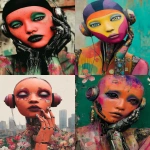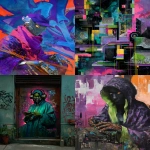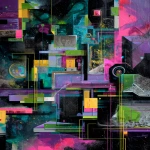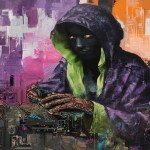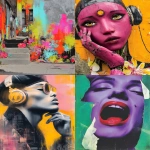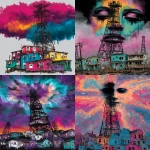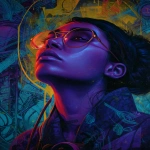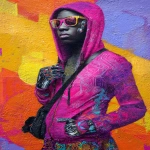Explore the Best AI Image Gallery
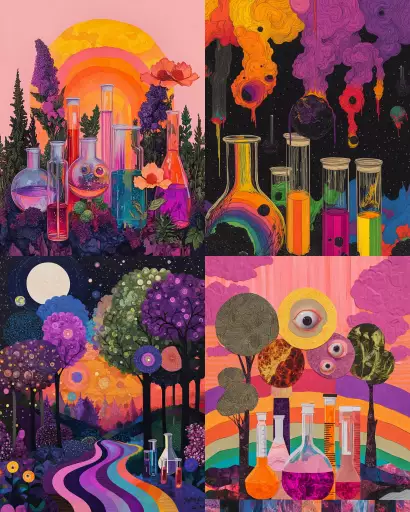
Blockchains Creative Canvas: Reshaping Finance and the Art World
The world of finance and art, traditionally separated spheres, are finding common ground in the innovative realm of blockchain technology. This transformative technology, known for its decentralized and transparent nature, is rewriting the rules of both industries, creating exciting opportunities and raising intriguing ethical questions.
Blockchains impact on finance is undeniable. Cryptocurrencies like Bitcoin and Ethereum have disrupted traditional financial systems, offering decentralized alternatives for transactions, investments, and fundraising. Smart contracts, self-executing agreements coded onto the blockchain, are streamlining processes, reducing costs, and fostering trust in financial interactions.
From NFTs to Tokenized Assets
One of the most significant applications of blockchain in finance is the emergence of Non-Fungible Tokens (NFTs). These unique digital assets represent ownership of digital or physical items, from artwork and music to virtual real estate and collectibles. NFTs have opened up new avenues for artists and creators to monetize their work directly, bypassing traditional gatekeepers like galleries and record labels.
Furthermore, blockchain enables the tokenization of real-world assets, such as real estate, stocks, and bonds. This process breaks down large assets into smaller, tradable units, increasing liquidity and accessibility for investors. Tokenized assets can be bought and sold on decentralized exchanges, offering greater transparency and efficiency compared to traditional markets.
Blockchains Impact on the Creative Industry
The intersection of blockchain and the creative industry is particularly fascinating. NFTs have empowered artists by providing a platform to showcase and sell their work directly to collectors worldwide. The ownership and provenance of digital art are securely recorded on the blockchain, combating counterfeiting and ensuring authenticity.
Beyond individual artworks, blockchain is transforming how creative projects are funded and managed. Decentralized Autonomous Organizations (DAOs) leverage blockchain technology to create transparent and community-driven governance structures for creative endeavors. Artists can raise funds from their fans through token sales, fostering direct relationships and shared ownership in their projects.
Ethical Considerations
While blockchain offers tremendous potential, it is crucial to address the ethical considerations associated with its implementation. Data privacy and security remain paramount concerns, as sensitive information is stored on the blockchain. Ensuring responsible use of blockchain technology and mitigating potential risks are essential for its long-term sustainability.
Future Trends
The future of blockchain in finance and the creative industry is brimming with possibilities. We can expect to see:
- Increased adoption of NFTs for diverse asset classes, including intellectual property and physical goods.
- Greater integration of blockchain into traditional financial systems, streamlining processes and reducing costs.
- Emergence of new decentralized platforms and marketplaces for creative works, fostering collaboration and innovation.
- Development of advanced applications leveraging artificial intelligence (AI) and blockchain to enhance creativity and artistic expression.
Blockchain technology is reshaping the financial landscape and empowering creators in unprecedented ways. As we navigate this evolving ecosystem, it is essential to embrace innovation while prioritizing ethical considerations and fostering a future where technology serves humanity and unlocks boundless creative potential.




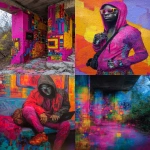

](https://images.ai-img.art/thumbnails/150/664a559b73eaff070d6f7fc7b3b151718aef9fa3a3f12f90b3c9092ceaa3cb56.webp)


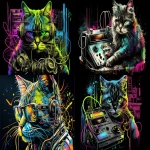
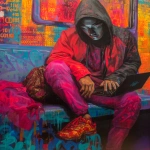




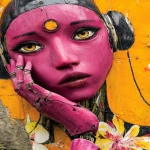








](https://images.ai-img.art/thumbnails/150/33d5e6d1da2b8ec2c4b8eab20d051c27c26d7a4991a77faf06fd03e96617fb1e.webp)
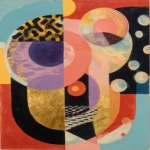

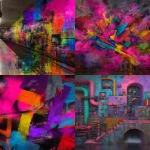

](https://images.ai-img.art/thumbnails/150/1aa8215ea9a4f6970e81a10bdb4feb3b08d5e1a202c3c7ed2c9380f2f63d5a74.webp)
